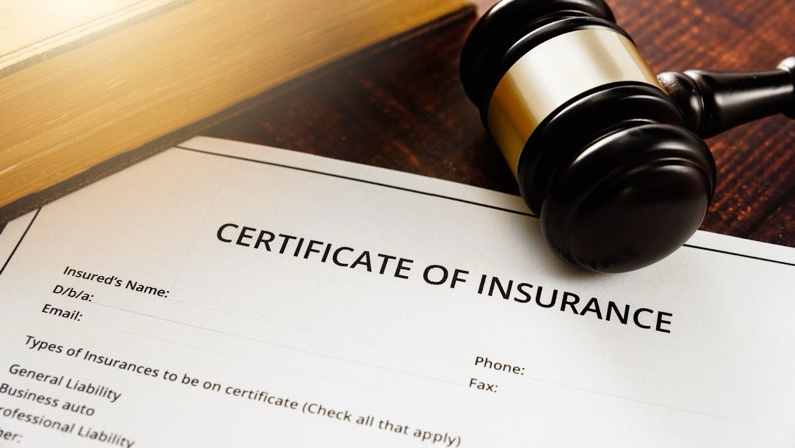
Running a business comes with its share of challenges, and staying protected against potential risks tops the list. That's where the Certificate of Insurance (COI) steps in—a straightforward yet crucial document that ensures your business is covered.
Understanding the complexities of a Certificate of Insurance is essential for business owners, contractors, and stakeholders alike. From verifying coverage to maintaining regulatory compliance, the COI serves as a cornerstone of risk mitigation strategies.

A Certificate of Insurance (COI) is a document issued by an insurance company or broker that verifies the existence of insurance coverage under specific terms. It serves as proof that a business holds insurance policies.
A certificate of insurance is not merely a piece of paper but a vital document that carries substantial importance for businesses operating across diverse industries. Let's discuss the significance of a certificate of insurance:
First and foremost, a certificate of insurance serves as concrete evidence that a business holds valid insurance coverage. In a world where contractual agreements and regulatory requirements abound, having proof of insurance coverage can be indispensable.
Whether engaging in partnerships, signing leases, or bidding on projects, stakeholders often demand tangible assurance of financial protection. The certificate of insurance acts as a tangible demonstration of the business's commitment to risk management and its ability to fulfill obligations in the event of unforeseen circumstances.
Moreover, regulatory compliance is a critical concern for businesses of all sizes. Many industries and jurisdictions mandate specific insurance coverage requirements to operate legally. Failing to meet these standards can result in penalties, fines, or even legal ramifications. A certificate of insurance ensures that businesses adhere to these regulatory frameworks, demonstrating their commitment to upholding legal and ethical standards.
By maintaining compliance, businesses safeguard their operations and also cultivate trust and credibility within their respective industries.
Beyond mere compliance, a certificate of insurance plays a pivotal role in mitigating risks. In today's increasingly litigious environment, businesses face many potential liabilities ranging from property damage to bodily injury and beyond. Comprehensive insurance coverage, as evidenced by a certificate of liability insurance, acts as a shield against these uncertainties.
It provides financial protection and peace of mind, empowering businesses to navigate challenges with resilience and confidence. Moreover, by transferring certain risks to insurance carriers, businesses can focus on their core operations and strategic objectives without being unduly burdened by the specter of unforeseen losses.
Businesses of all shapes and sizes, spanning a wide array of industries, find themselves in need of a certificate of insurance to safeguard their operations, protect their assets, and mitigate potential risks. Here are the types of businesses that commonly require a certificate of insurance:

One of the most prominent categories of businesses that necessitate a certificate of insurance is contractors. Whether they specialize in construction, renovation, landscaping, or any other trade, contractors typically operate in environments laden with inherent risks. From property damage to bodily injury and third-party liabilities, the nature of their work exposes them to various potential hazards.
Clients, project owners, and regulatory bodies often require contractors to carry specific types and levels of insurance coverage as a condition of engagement. A certificate of insurance for contractors serves as tangible evidence that they have obtained the necessary coverage, instilling confidence in stakeholders and ensuring compliance with contractual obligations.
Service-oriented businesses, including consultants, professionals, and freelancers, also frequently require certificates of insurance. These businesses often interact closely with clients, providing expertise, advice, or specialized services. In the course of their operations, they may encounter situations where their actions or recommendations inadvertently result in financial losses or legal disputes for their clients.
By maintaining appropriate insurance coverage, service providers can mitigate the financial risks associated with potential errors, omissions, or professional negligence. A certificate of insurance not only assures clients of the service provider's commitment to accountability and quality but also shields both parties from the adverse consequences of unforeseen events.
Retail establishments, wholesalers, distributors, and merchants that sell goods or products may also require certificates of insurance. These businesses often operate in physical spaces accessible to customers, employees, and vendors, thereby exposing themselves to various liability risks. Slip-and-fall accidents, product defects, property damage, and allegations of negligence are just a few examples of the potential liabilities that retailers may face.
By obtaining appropriate insurance coverage and presenting a certificate of insurance when requested, retailers can mitigate these risks and protect their financial interests. Additionally, landlords, property managers, and leasing agents may require tenants to provide certificates of insurance as part of lease agreements, ensuring that the property is adequately protected against potential losses or damages.

A standard certificate of insurance outlines essential details, such as the type of coverage, policy limits, effective dates, and the insurance company's contact information.
Providing a certificate of business insurance demonstrates your commitment to mitigating risks and complying with contractual or regulatory obligations, fostering trust among clients and partners.
Securing a certificate of insurance is a pivotal step for businesses seeking to demonstrate their commitment to risk management, comply with contractual obligations, and instill confidence in stakeholders. Here's a detailed guide of the process involved in obtaining a certificate of insurance:
The first step in obtaining a certificate of insurance is to reach out to a broker or reputable insurance provider, such as Hotchkiss Insurance. These professionals serve as invaluable resources in navigating the complexities of insurance policies, coverage options, and documentation requirements.
Whether you have an existing relationship with an insurance provider or are exploring options for coverage, your insurance representative can guide you through the process of obtaining a certificate of insurance.
When requesting a certificate of insurance, be prepared to provide specific details and information about your business, insurance policies, and coverage requirements. Your insurance provider or broker will likely need to know the name and address of your business, the types and limits of insurance coverage you carry, policy numbers, effective dates, and any additional insured parties or endorsements required.
Identify the parties or entities to whom the certificate of insurance should be issued. This may include clients, customers, vendors, landlords, contractors, or regulatory agencies. Additionally, clarify any specific requirements or endorsements that must be included in the certificate to ensure compliance with contractual obligations or industry standards.
Before issuing the certificate of insurance, your insurance provider or broker will review your insurance policies and coverage details to ensure accuracy and completeness. Verify that the coverage outlined in the certificate aligns with the contractual requirements and risk exposures relevant to your business operations. Address any discrepancies or concerns with your insurance representative to ensure that the certificate reflects your coverage needs accurately.
Once the necessary information has been provided and reviewed, your insurance provider or broker will issue the certificate of insurance. The certificate typically includes essential details such as the insured party's name, policy numbers, coverage types and limits, effective dates, and any additional insured or certificate holder endorsements. Depending on the urgency of the request, certificates of insurance may be issued electronically or in hard copy format.
Upon receiving the certificate of insurance, distribute copies to the designated recipients as specified in your agreements or contracts. Ensure that all relevant parties are informed of your insurance coverage and have access to the necessary documentation to verify your compliance with contractual requirements or regulatory standards.
Requesting a certificate of insurance safeguards your interests by ensuring that the parties involved maintain adequate insurance coverage, reducing potential liabilities and disputes.

A certificate of insurance serves as a critical document in several scenarios, each highlighting its importance in different aspects of business operations and risk management:
One of the primary instances where a certificate of insurance is required is in contractual agreements. Whether you're entering into a lease agreement, subcontracting work, or collaborating on a project, many contracts stipulate that all involved parties must carry specific types and levels of insurance coverage.
By providing a certificate of insurance, businesses can demonstrate their financial responsibility and ability to fulfill contractual obligations. This document offers assurance to contract partners that they will be protected in the event of unforeseen circumstances such as property damage, bodily injury, or liability claims. Failure to provide a certificate of insurance as required by contract terms may result in legal disputes, financial liabilities, or even termination of the agreement.
In addition to contractual obligations, a certificate of insurance plays a crucial role in building and maintaining client trust. Clients, customers, and business partners often seek reassurance that they are working with reputable and responsible entities. By presenting a certificate of insurance, businesses convey their commitment to risk management and financial stability.
This transparency fosters trust and confidence among clients, assuring them that their interests are protected and that they are not assuming undue risks by engaging in business transactions. Moreover, the availability of insurance coverage can enhance the credibility and competitiveness of businesses in the marketplace, setting them apart as reliable and trustworthy partners.
Furthermore, regulatory compliance represents another imperative for obtaining a certificate of insurance. Many industries and jurisdictions impose legal requirements regarding insurance coverage to ensure public safety, consumer protection, and financial security. Businesses operating in regulated sectors such as construction, healthcare, transportation, and finance must adhere to specific insurance mandates prescribed by regulatory authorities.
Failure to maintain adequate insurance coverage and provide proof of insurance as required by law can result in penalties, fines, or even suspension of business operations. By obtaining and maintaining certificates of insurance that align with regulatory standards, businesses demonstrate their commitment to compliance and uphold the integrity of their operations within the legal framework.
The cost of a certificate of insurance varies depending on factors such as the type of coverage, policy limits, and the insurance provider's pricing structure.
The certificate of insurance is a key player in responsible risk management and business operations across diverse industries. From providing proof of coverage in contractual agreements to fostering client trust and ensuring regulatory compliance, its importance cannot be overstated. By obtaining and maintaining certificates of insurance, businesses demonstrate their commitment to accountability, reliability, and resilience in the face of unforeseen challenges.
Hotchkiss Insurance stands out as a premier insurance agency in Texas, offering comprehensive coverage for home builders, independent trade contractors, general contractors, and commercial contractors. With their expertise and tailored solutions, Hotchkiss Insurance ensures that your business remains protected against unforeseen risks. Get in touch today to secure your peace of mind.